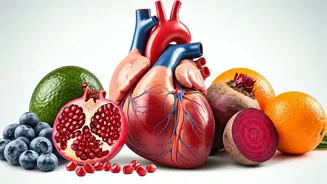Introduction: Heart Health
Maintaining a healthy heart is a priority for overall wellness. Issues like heart blockages and damaged blood vessels are serious concerns, often stemming
from lifestyle and dietary choices. However, certain foods possess the remarkable ability to support cardiovascular health. Understanding the impact of what you eat can be a pivotal step in preventing heart disease and promoting longevity. This article will focus on five powerful food choices, explaining their specific benefits and offering practical advice on their incorporation into your diet. This will equip you with knowledge, enabling you to take proactive steps towards a healthier heart and overall well-being. Focusing on a diet rich in these foods can significantly contribute to reducing the risk of cardiovascular diseases.
Section 1: Garlic's Impact
Garlic has a long-standing reputation for its medicinal properties, particularly concerning heart health. Its key active compound, allicin, is instrumental in preventing the buildup of plaque in arteries. Plaque accumulation is a major contributor to blockages and cardiovascular complications. Consuming garlic regularly helps in relaxing blood vessels, which improves blood flow and reduces strain on the heart. Furthermore, garlic can lower cholesterol levels, a significant risk factor for heart disease. This multifaceted approach to heart health makes garlic a valuable addition to any diet. Garlic can be incorporated in several ways: minced and added to cooked dishes, used as a flavor enhancer in sauces, or even consumed in supplement form. Regular intake is associated with not only reduced risk of heart blockages but also enhanced overall cardiovascular function. It is a natural and effective ingredient for promoting heart health.
Section 2: The Power of Turmeric
Turmeric, a spice popular in Indian cuisine, is another dietary ally in promoting heart health. Its main active component, curcumin, has potent anti-inflammatory and antioxidant effects. Inflammation is a key driver in the development and progression of heart disease. Curcumin helps to counter this process, thereby protecting the heart. Furthermore, curcumin is known to improve the function of the endothelium, the inner lining of blood vessels, ensuring their optimal performance. Curcumin aids in preventing blood clots and can lower cholesterol levels, reducing the risk of blockages. Incorporating turmeric into your daily meals is simple. It can be added to curries, stews, and vegetable dishes. It can also be consumed in supplement form, ensuring a consistent intake of curcumin. By including turmeric in your diet, you provide your cardiovascular system with a powerful, natural defense against heart disease.
Section 3: Fatty Fish Benefits
Fatty fish, such as salmon and mackerel, are abundant in omega-3 fatty acids, which provide significant benefits for heart health. Omega-3s help reduce triglycerides, a type of fat found in the blood. High levels of triglycerides contribute to the formation of plaque in the arteries. Regular consumption of fatty fish reduces the risk of blood clots, helping blood flow more freely. Furthermore, omega-3 fatty acids have anti-inflammatory properties, providing another layer of protection for your cardiovascular system. They are also linked with improved blood pressure and reduced risk of irregular heartbeats. Aim for at least two servings of fatty fish per week. Consider grilling, baking, or steaming fish to preserve its nutritional value. Incorporating these into your diet provides an excellent source of omega-3s, promoting heart health and overall well-being.
Section 4: Citrus Fruits' Role
Citrus fruits, including oranges and grapefruits, are rich in vitamin C and antioxidants, which play a significant role in improving heart health. Vitamin C helps to strengthen blood vessels and protects them from damage caused by free radicals. This damage can contribute to the formation of plaque and blockages. Moreover, citrus fruits contain soluble fiber, which helps lower cholesterol levels, another crucial benefit. The antioxidants in citrus fruits fight inflammation, reducing the risk of heart disease. Consuming citrus fruits daily can be simple and enjoyable. You can eat them as snacks, add them to salads, or include them in your breakfast. Ensure that you consume a variety of citrus fruits to obtain the various benefits of each. Through incorporating these fruits, you can provide your body with essential nutrients for maintaining a healthy heart and reducing the risk of cardiovascular complications.













